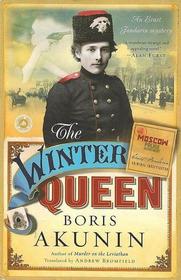Dorothy E. (islandflower) reviewed The Winter Queen (Erast Fandorin, Bk 1) on + 28 more book reviews
Helpful Score: 6
Great fun: lots of twists and turns in the plot and also lots of atmosphere ( Moscow in the late 1800's).
Helpful Score: 5
So glad to have discovered Akunin, and this is my favorite of the three I've read thus far. The pre-Revolutionary Russia is refreshing and Victorian, so to speak, the character of Fandorin fascinating, and the mystery/adventure convoluted and intelligent. Delightful.
Helpful Score: 4
The Book Report: Young, orphaned Erast Fandorin has landed a comparatively cushy job for one whose comfortable future in czarist Russia was snatched away by the machinations of capitalists, beggaring and causing the suicide of his father: Erast is a fourteenth-class state functionary, serving a police official as amanuensis and errand-boy. It leads him into some odd alleyways, serving his about-to-retire master; his wit, his proficiency with language, his unquenchable curiosity lead his boss to allow, amused and indulgent of his junior's silly fascination with nothing criminal, Erast to investigate some odd goings-on among Moscow's Bright Young Things, including the suicide of a youth whose estate, over a million rubles, is left to elderly English philanthropist Baroness Adair.
That one fact, that odd itchy ill-fitting wool sock of a fact, unravels an international conspiracy touching every government in the world, though it is unclear that this conspiracy has any evil intent, at least to me. Erast, extremely young and naive at the outset of the book, ends it extremely young, concussed, and in no possible sense naive and inexperienced any more. How that comes about is a page-turning pleasure to read.
My Review: For once, I am glad I read the second book in the series before the first. I felt much more like I was investing my time wisely after reading Turkish Gambit than I might have had I read this book first. It's good, don't mistake me, but it's not as good as "Gambit" and it's not as clear and succinct, either.
But good golly Miss Molly, it's a ripping good read full of explosions, betrayals, and general all-around wickedness and sneakiness. It's got young love, it's got hopeless infatuation, it's got comradeship and affection, and even a *very* memorable wedding scene. I am completely entranced with its picture of czarist Russia; I am excited to discover the roots of some of Erast's oddities; and I hanker to see these books turned into movies or TV shows, like Montalbano has been. I really feel I can SEE the action as I'm reading, and that's usually so much less of an issue for me; but this series is supremely visual.
Read, and enjoy, and don't fear the commitment of time a new series requires, because like Rutledge, like Montalbano, there are a lot of 'em and they get better as time goes by.
That one fact, that odd itchy ill-fitting wool sock of a fact, unravels an international conspiracy touching every government in the world, though it is unclear that this conspiracy has any evil intent, at least to me. Erast, extremely young and naive at the outset of the book, ends it extremely young, concussed, and in no possible sense naive and inexperienced any more. How that comes about is a page-turning pleasure to read.
My Review: For once, I am glad I read the second book in the series before the first. I felt much more like I was investing my time wisely after reading Turkish Gambit than I might have had I read this book first. It's good, don't mistake me, but it's not as good as "Gambit" and it's not as clear and succinct, either.
But good golly Miss Molly, it's a ripping good read full of explosions, betrayals, and general all-around wickedness and sneakiness. It's got young love, it's got hopeless infatuation, it's got comradeship and affection, and even a *very* memorable wedding scene. I am completely entranced with its picture of czarist Russia; I am excited to discover the roots of some of Erast's oddities; and I hanker to see these books turned into movies or TV shows, like Montalbano has been. I really feel I can SEE the action as I'm reading, and that's usually so much less of an issue for me; but this series is supremely visual.
Read, and enjoy, and don't fear the commitment of time a new series requires, because like Rutledge, like Montalbano, there are a lot of 'em and they get better as time goes by.
Helpful Score: 3
Three million copies of Akunin's Erast Fandorin historical mystery series have been sold in Russia, where the author is a celebrity. This volume--the first of nine installments so far--should get the series off to a rousing start in the U.S. It's set in Czarist Russia and stars the naive but eager Fandorin as a young investigator with the Moscow police. Why would a university student shoot himself in the middle of the Alexander Gardens? Fandorin sets out to find the answer and soon lands in the middle of a far-reaching international conspiracy. Yakunin effectively juxtaposes the comical innocence of his hero against the decadence of nineteenth-century Moscow--aristocrats idling in gambling clubs while the winds of revolution freshen. In his debut, Fandorin comes across as an odd but appealing mix of Holmesian brilliance and Inspector Clousseauian bumbling. Occasionally, Akunin's style seems a bit affected, aping the manner of, say, Thackeray, commenting on the foibles of his characters, but at the same time, that nineteenth-century tone is part of the book's appeal. Anne Perry fans, in particular, will enjoy this series.
Helpful Score: 3
If you enjoy historical mysteries set in different time periods and different lands you will enjoy this book. Set in Russia. Takes a little while to get going but the plot is good.





